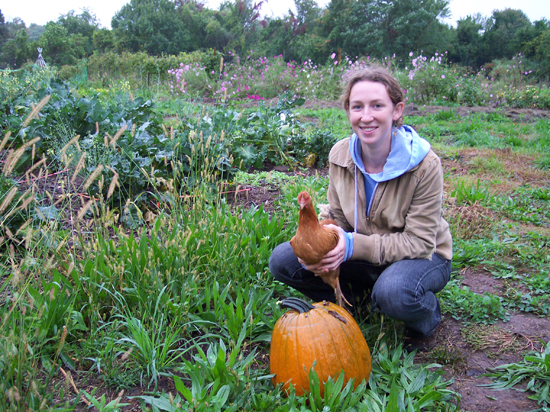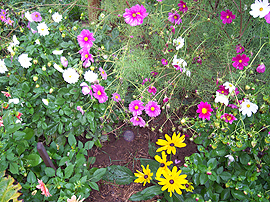Long Lane Farming Club Hosts Pumpkin Fest
 |
 Long Lane Farming Club member Rachel Ostlund 08 will welcome the community to the clubs annual Pumpkin Fest Oct. 29. At left, a flower garden still blooms at the farm, located south of Physical Plant and Wesleyan University Press. Long Lane Farming Club member Rachel Ostlund 08 will welcome the community to the clubs annual Pumpkin Fest Oct. 29. At left, a flower garden still blooms at the farm, located south of Physical Plant and Wesleyan University Press. |
| Posted 10/18/05 |
| Wesleyans Long Lane Farming Club will hold its second annual Pumpkin Fest from 2 to 7 p.m. Saturday Oct. 29 and people from the campus and the local community are welcome to attend. But while the freshly-grown pumpkins available the fest will be locally-grown, they wont be a product of the students land.
We had some problems this year with our primitive watering system and squash beetles, says Long Lane Farm Club member Rachel Ostlund 08, an earth and environmental sciences major. Sometimes you have a good crop, sometimes not. It is all part of learning how to farm. These problems left the student-farmers with less than two dozen pumpkins. But the fest had to go on, so the students carved-out a deal with a local orchard, which will deliver 300 pumpkins for the festival. The Middletown community is welcome to attend the fest. Attendees can participate in pumpkin carving, face painting, a Halloween costume contest, bobbing for apples, as well as learn about agriculture. The farm is located on the corner of Long Lane and Wadsworth Street, south of Physical Plant and Wesleyan University Press. Student and faculty bands will provide entertainment. Pumpkins are among 80 varieties of vegetables and herbs grown in the two-year-old organic garden. In 2004, Rachel Lindsay 05 planted the first crops in a circular-shaped 50-ft-wide plot. Local residents rounded out the corners with garlic and potato gardens, among several flower beds. A few flower species are still blooming this month in the farm yard. Lindsay, Ostlund and other Wesleyan students later planted a tomato and broccoli garden, among rows of Swiss chard, pumpkins and squash. Much of the one-acre plot of old farmland was hand-tilled by the students. Long Lane Farm, Ostlund explains, was created so students would have a place to come together and learn about food security issues. Its used as an educational tool and will be adapted to meet the requests of the community. This summer, the Earth and Environmental Sciences Department, the Rockfall Foundation and area shareholders paid for Lindsay and Ostlund to work full-time at the farm. Students from local high schools helped out four days a week and dozens of community members volunteered. The projects they undertook included the installation of an underground woodchuck fence and an above ground deer and critter fence. The garden flourished, producing more vegetables than the student workers and the gardens shareholders could consume. They sold some produce to local restaurants and grocers, and donated other crops to a local soup kitchen. Any left-overs are tossed into the farms chicken coop. Those chickens will eat just about anything, Ostlund says, peering into student-maintained coop that houses a dozen hens. Nothing goes to waste. Ostlund, of Ithaca, N.Y., says shes never tended a garden before, but grew a green thumb after working in an organic farm with AmeriCorps. She also seeks advice from local residents who volunteer at the farm. The gardens guests have donated compost, manure, mulch and two greenhouses, which will be useful this winter. For the last two years, the students started plants in their dorm rooms and planted the seedlings into the garden when the weather conditions allowed. Several Wesleyan staff and faculty also work at the farm. Michael Singer, assistant professor of biology, got involved in the Long Lane Farm as a way to help sustain the environment and human health. The students are cultivating not only the land, but a deep relationship with nature, Singer says. In addition, building and running the farm requires that the students work cooperatively, understand the details of food production, and make difficult and consequential decisions. In essence, it is a chance for these students to test and live up to their ideals, a tremendously valuable experience. |
| By Olivia Drake, The Wesleyan Connection editor |

